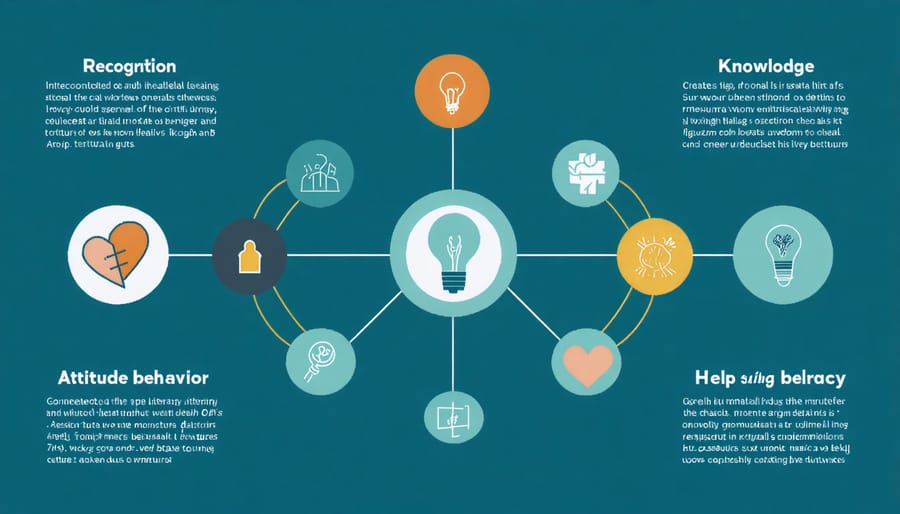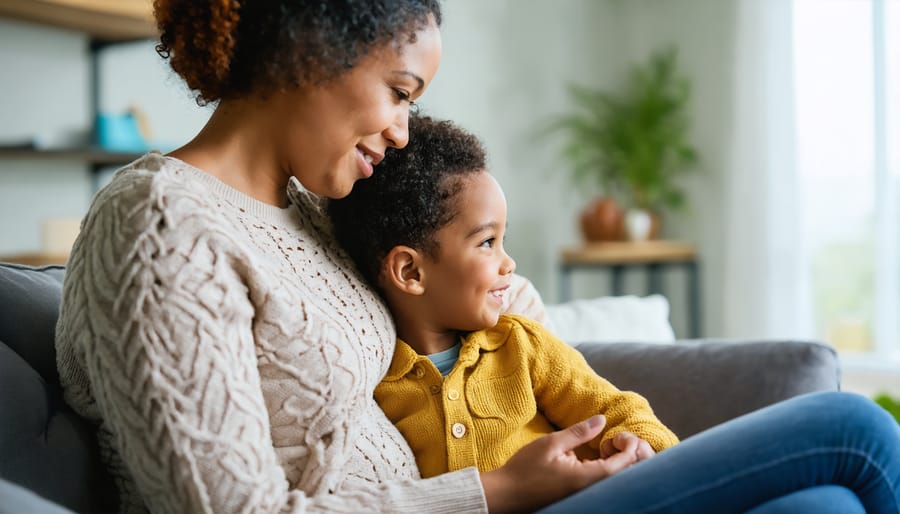Mental health literacy empowers us to recognize, understand, and effectively respond to mental health challenges in ourselves and others. Just as we learn to read and write, developing the ability to support children’s emotional well-being requires specific knowledge and skills. This vital competency encompasses understanding mental health symptoms, knowing when to seek help, and breaking down stigma through education and awareness. For parents, teachers, and healthcare professionals, strong mental health literacy serves as a foundation for creating supportive environments where children can thrive emotionally. By enhancing our mental health literacy, we become better equipped to identify early warning signs, engage in meaningful conversations about mental wellness, and connect those in need with appropriate resources and professional support. This understanding not only transforms how we approach mental health but also builds more resilient and emotionally aware communities.
What is Mental Health Literacy?
Key Components of Mental Health Literacy
Mental health literacy comprises four essential components that work together to help individuals better understand and respond to mental health challenges. The first component is recognition – the ability to identify signs and symptoms of mental health conditions. For parents and teachers, this might mean noticing changes in a child’s behavior, sleep patterns, or social interactions that could indicate emotional difficulties.
Knowledge forms the second key component, encompassing understanding of mental health conditions, their causes, and available treatment options. This includes being familiar with common childhood mental health challenges like anxiety and depression, and knowing that these conditions are both real and treatable.
Attitudes make up the third component, referring to beliefs about mental health and people experiencing mental health challenges. Positive, non-judgmental attitudes help create an environment where children feel safe discussing their feelings and seeking help. As Dr. Sarah Chen, a child psychologist, notes, “When we approach mental health with openness and compassion, we make it easier for children to express their struggles.”
The fourth component is help-seeking behaviors – knowing when and how to get professional support. This includes understanding the different types of mental health professionals, recognizing when professional help is needed, and feeling confident in taking action to access care. For example, knowing whom to contact when a child shows signs of emotional distress, whether it’s a school counselor, family doctor, or mental health specialist.

Why Mental Health Literacy Matters for Children

Early Recognition and Prevention
Mental health literacy empowers individuals to recognize potential warning signs before they develop into more serious concerns. When parents, teachers, and caregivers understand what to look for, they can intervene early and support children more effectively.
Common early warning signs include changes in sleeping or eating patterns, withdrawal from friends and activities, unusual irritability, or declining academic performance. Being able to distinguish between typical developmental challenges and potential mental health concerns is crucial for timely intervention.
Dr. Sarah Chen, a child psychiatrist, explains, “Think of mental health literacy as your emotional first aid kit. The sooner you can spot signs that a child is struggling, the better equipped you are to help them before issues escalate.”
Through mental health literacy, adults learn to create open dialogues with children about feelings and emotions. This awareness helps normalize mental health discussions and reduces barriers to seeking help. For example, when eight-year-old Maya started showing signs of anxiety, her teacher’s mental health knowledge helped initiate a supportive conversation with her parents, leading to early intervention and positive outcomes.
Remember, early recognition isn’t about diagnosing conditions but rather about knowing when and how to seek professional guidance.
Building Resilience
Understanding mental health literacy plays a crucial role in building resilience in children and developing emotional strength. When we better understand mental health concepts, we become more equipped to recognize challenges early, seek appropriate support, and develop effective coping strategies.
Think of mental health literacy as building blocks for emotional strength. Just as we teach children to identify and express physical pain, understanding mental health helps them recognize and communicate their emotional needs. This awareness creates a foundation for developing healthy coping mechanisms and seeking help when needed.
Parents and educators who are mentally health literate can model healthy emotional responses and create supportive environments where children feel safe discussing their feelings. This open dialogue helps children develop self-awareness and emotional regulation skills, essential components of resilience.
Dr. Sarah Chen, a child psychologist, notes, “When children understand that mental health challenges are normal and manageable, they’re more likely to bounce back from difficulties and maintain a positive outlook.” This understanding reduces shame and encourages proactive mental health management.
Developing Mental Health Literacy at Home
Building mental health literacy at home starts with creating an open and supportive environment where conversations about emotions and mental well-being flow naturally. Parents can begin by modeling healthy emotional expression and introducing age-appropriate discussions about feelings during daily activities.
Start by establishing regular “emotional check-ins” during family meals or bedtime routines. Use simple questions like “How did your heart feel today?” for younger children or “What challenged you today?” for older ones. These conversations normalize mental health discussions and help children develop emotional vocabulary.
Incorporate mindful practices for mental wellness into your family routine. This might include breathing exercises, gratitude journaling, or creating a “feelings corner” where children can go to process emotions safely.
Make mental health education engaging through storytelling and creative activities. Read books featuring characters dealing with various emotions, create emotion wheels together, or use art projects to express feelings. These activities help children understand that mental health is as important as physical health.
Keep resource materials accessible, such as child-friendly books about emotions, stress-relief tools, and contact information for mental health professionals. Remember to celebrate small victories in emotional growth and maintain a judgment-free space where all feelings are acknowledged and validated.

Mental health literacy is an ongoing journey that requires continuous learning, open dialogue, and active engagement from all members of our community. By understanding its core components – recognizing signs of mental health challenges, knowing where to seek help, and breaking down stigma – we can create a more supportive environment for our children’s emotional wellbeing. Remember, every conversation about mental health helps build awareness and understanding. Whether you’re a parent, teacher, or healthcare professional, your role in promoting mental health literacy makes a real difference. Let’s continue working together to ensure our children grow up in a world where mental health is discussed as openly and compassionately as physical health. Start today by sharing what you’ve learned and keeping these important conversations going in your family, school, or workplace.




